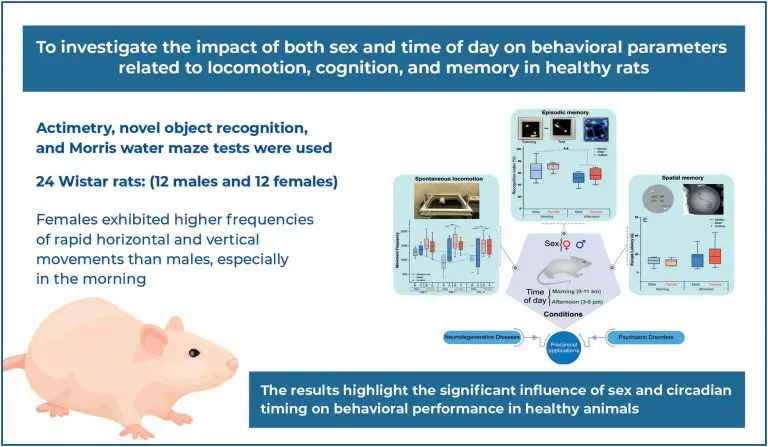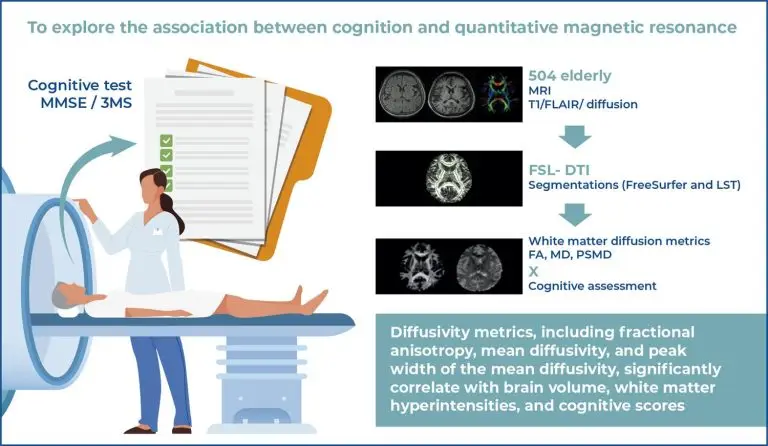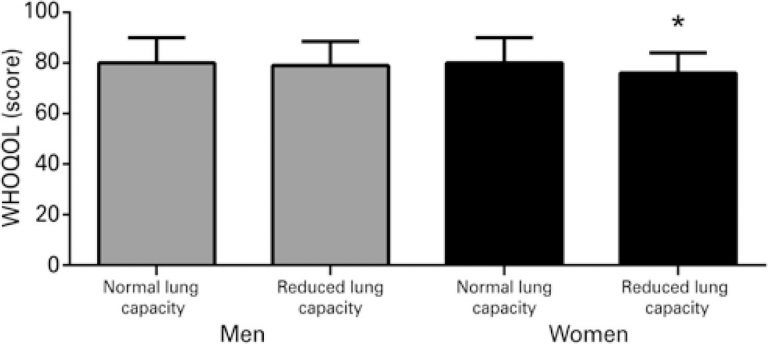13/Oct/2025
Assessing the impact of sex and circadian rhythms on rodent behavior: refining preclinical study designs
einstein (São Paulo). 13/Oct/2025;23:eAO1614.
View Article13/Oct/2025
Assessing the impact of sex and circadian rhythms on rodent behavior: refining preclinical study designs
DOI: 10.31744/einstein_journal/2025AO1614
Highlights ■ Sex plays a crucial role in behavioral assessments of preclinical study designs. ■ Circadian rhythm influences episodic memory performance in rodent behavior. ■ Spatial memory exhibits fewer variations than locomotion and episodic memory. ■ Sex and the circadian cycle are critical factors in behavioral assessment. ABSTRACT Objective: This study aimed to investigate the effects of sex and time of day on behavioral parameters in healthy rats, focusing on locomotion, cognition, and memory (both spatial and episodic). Methods: Twenty-four […]
Keywords: Behavior, animal; Circadian rhythm; Cognition; Locomotion; Memory, episodic; Neurodegenerative diseases; Rats, Wistar; Sex; Spatial memory
22/Sep/2025
Exploring the relationship between cognitive performance and magnetic resonance imaging diffusion parameters in elderly individuals
einstein (São Paulo). 22/Sep/2025;23:eAO1467.
View Article22/Sep/2025
Exploring the relationship between cognitive performance and magnetic resonance imaging diffusion parameters in elderly individuals
DOI: 10.31744/einstein_journal/2024AO1467
Highlights ■ First study to investigate associations between cognitive performance and brain magnetic resonance imaging parameters in an older Brazilian population. ■ Uses advanced magnetic resonance imaging diffusion tensor imaging and automated analysis to quantify brain changes. ■ Validates findings through comparison with data from a large UK-based cohort. ■ Focuses on region-specific assessments, such as the superior longitudinal fasciculus and other key brain areas related to cognition. ■ Demonstrates significant correlation between 3MS and MMSE cognitive scores and diffusion […]
Keywords: Aged; Cognition; Cognitive dysfunction; Dementia; Diffusion tensor imaging; Magnetic resonance imaging; Neuroimaging; Neuropsychological tests
28/Jan/2019
Association between respiratory capacity, quality of life and cognitive function in elderly individuals
DOI: 10.31744/einstein_journal/2019AO4337
ABSTRACT Objective To investigate associations between respiratory capacity, quality of life and cognitive function in elderly individuals. Methods The sample included 386 elderly individuals (232 women). Respiratory capacity assessment was based on maximal expiratory pressure measured at peak expiratory flow. Subjects were classified according to peak expiratory flow values adjusted for sex, age and height of individuals with normal (peak expiratory flow curve 60%) or reduced (peak expiratory flow curve < 60%) respiratory capacity. The World Health Organization Quality of [...]
Keywords: Aged; Cognition; Maximal voluntary ventilation; Quality of life
29/Oct/2012
Dementia Rating Scale psychometric study and its applicability in long term care institutions in Brazil
DOI: 10.1590/S1679-45082012000300011
OBJECTIVE: To evaluate the diagnostic sensitivity, specificity, and agreement of the Dementia Rating Scale with clinical diagnosis of cognitive impairment and to compare its psychometric measures with those from Mini Mental State Examination. METHODS: Eighty-six elders from a long-term care institution were invited to participate in a study, and fifty-eight agreed to participate. The global health assessment protocol applied to these elders contained Mini Mental State Examination and Dementia Rating Scale. Clinical diagnose of cognitive impairment was performed by experts […]
Keywords: Aged; Cognition; Delirium, dementia, amnestic, cognitive disorders; Homes for the aged; Neuropsychological tests; Scales; Sensitivity and specificity




